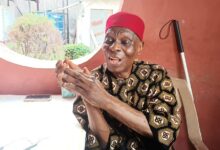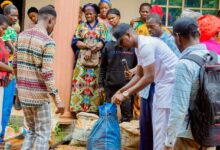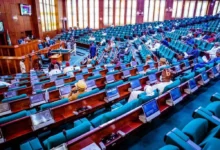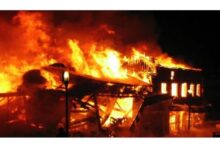
𝑁𝑟𝑖 𝑂𝑘𝑜𝑛𝑘𝑤𝑜 𝑔𝑎𝑣𝑒 𝑡ℎ𝑒 𝑓𝑜𝑙𝑙𝑜𝑤𝑖𝑛𝑔 𝑎𝑐𝑐𝑜𝑢𝑛𝑡 𝑜𝑓 ℎ𝑜𝑤 ℎ𝑒 𝑐𝑎𝑚𝑒 𝑡𝑜 𝑡𝑎𝑘𝑒 𝑢𝑝 𝑡ℎ𝑒 𝑝𝑜𝑠𝑡 𝑜𝑓 𝐸𝑧𝑒 𝑁𝑟𝑖. 𝐻𝑒 𝑠𝑡𝑎𝑡𝑒𝑑 𝑡ℎ𝑎𝑡 ℎ𝑒 ℎ𝑎𝑑 𝑏𝑒𝑒𝑛 𝑠𝑒𝑟𝑖𝑜𝑢𝑠𝑙𝑦 𝑖𝑙𝑙, 𝑡𝑜𝑜 𝑖𝑙𝑙 𝑡𝑜 𝑚𝑜𝑣𝑒 𝑎𝑏𝑜𝑢𝑡, 𝑓𝑜𝑟 𝑠𝑜𝑚𝑒 𝑡ℎ𝑖𝑟𝑡𝑒𝑒𝑛 𝑦𝑒𝑎𝑟𝑠. 𝐷𝑢𝑟𝑖𝑛𝑔 𝑡ℎ𝑎𝑡 𝑡𝑖𝑚𝑒 ℎ𝑒 𝑠𝑒𝑛𝑡 𝑣𝑎𝑟𝑖𝑜𝑢𝑠 𝑚𝑒𝑚𝑏𝑒𝑟𝑠 𝑜𝑓 ℎ𝑖𝑠 𝑓𝑎𝑚𝑖𝑙𝑦 𝑡𝑜 𝑑𝑖𝑏𝑖𝑎 𝑎𝑓𝑎, 𝑡𝑜 𝑐𝑜𝑛𝑠𝑢𝑙𝑡 𝑡ℎ𝑒 𝑚𝑚𝑜 𝑓𝑜𝑟 𝑡ℎ𝑒 𝑟𝑒𝑎𝑠𝑜𝑛 𝑜𝑓 ℎ𝑖𝑠 𝑝𝑟𝑜𝑡𝑟𝑎𝑐𝑡𝑒𝑑 𝑖𝑙𝑙𝑛𝑒𝑠𝑠.
“Each time the message came back from dibia afa that it was the mmo of the eze Ndri who were calling me to take up the post. At length I consented to take up the post, and I made sacrifices at the iru mmuo here, at the foot of this large Iroko tree.
I then made initial sacrifices to all the alusi in Oraeri town. The great omen at last arrived that really convinced me that the mmo were calling me. The walls of my compound fell down for no apparent cause, in the dry season.
Both my parents were dead before I took up the post, for no mother or father may see their son as an eze Ndri. I was told by my people that I would have to sacrifice on behalf of the town twenty cows before they could recognise me as being selected of the gods to be their head and owner.
The first step in the ceremony is to drag a large Iroko log into the eze ama, or royal courtyard, and place it before this growing iroko tree, where the iru mmo is situated. On this log, after having washed my body in my house, I stand to make sacrifices before I am led away by the Adama people into the thicket of bush on the right of this eze ama.
In this thicket I am stripped naked and whitened all over with white clay. The Adama do all this to me, for of the Adama it is said, “fa natu eze Ndri oto” (the Adama see the nakedness of the eze Ndri.) My four new ofo sticks, which have been consecrated by having eight chickens sacrificed over them, are also whitened then with white clay. A white cloth called ajaghadi is tied about my loins, while four omu are tied round my neck and another four around my waist. A special cap, native-made, and called okpu ogodo with eight ugo feathers in it, is placed on my head by an Adama man.
The next step is for the Adama men to lift me up, and gently place me on my stool and take me off again. This process is repeated four times. As they do this, they declare that all defilements and abominations are thereby removed, and that if hereafter I ever fall to the ground no nso (pollution) occurs. I am no longer like other people. No one is allowed to touch me, except the Adama and small children, i.e., those who are not yet of adult age and so are not capable of polluting by their touch. I may not eat in public but alone and in silence.
After this, I now start off on my circumambulation to the Niger (Osi Mili) accompanied by many of my people.
I visited the town of Enugu Adazi and at the ndichie of Enugu Adazi a goat is sacrificed. From there I proceeded to Nokwa where a she-goat is sacrificed to the alusi, Eke Nokwa.
From Nokwa I went to Nobi where a number of sacrifices were made. A goat and a fowl were sacrificed to the ndichie in Nobi. Then a sacrifice is made before the ndichie of Emu Ona Nobi which is the name of an umunna in Nobi. The last sacrifice, a goat, in Nobi is to the alusi called Idem Mili, i.e., the large water. This water is a river that flows into the Osi Mili.
In Nobi I received instructions and directions for the next stage on my journey. From Nobi I and my followers pass to Agbaja where a goat and a hen are sacrificed before the ndichie of Newichi’s umunna. While in Agbaja I go to the umunna of Abolo. There the ishinze produced an object, which looks like a bar of iron, the length of a man’s arm. It is, however, so old and covered with grime that it is not possible to say what the metal is. The ishinze stated that this bar of iron was handed to him by the first eze Ndri. It is presently covered with a cloth, and is never allowed to rest on the ground. It was placed on a piece of wood while a she-goat, a cock and a chicken were sacrificed over it.
From Agbaja I proceeded to the town of Ojoto. In that town a sacrifice was made to the ndichie but I cannot remember its name. From Ojoto I passed to the town of Oba. There I handed over a goat and a cock to sacrifice to the ndichie in the square. In that same place is the alusi called Udo Oba, and to it I gave in sacrifice a she-goat and a cock.
That night I stayed in the town of Oba and the next day I proceeded to the town of Obosi, to the house of the Igwe (i.e., to the obu of the eze of Obosi.) He provided, night and morning, three pots of palm wine for all my retainers who stayed there. In Obosi I made a sacrifice of a she-goat, a ram, a sheep and a number of fowls to the ndichie of the Igwe.
From the Igwe of Obosi I went to the eze of Onitsha on the Osi Mili. I entered his place with two kids. One of these kids the eze kept and the other was sacrificed. A third kid was sacrificed to the alusi called Ogugu. Fowls were sacrificed to Ojuku Onitsha and to Ana Onitsha and to three other alusi whose names I have forgotten.
After a long delay, the eze Onitsha appointed a man to guide me to the Osi Mili. A huge crowd had gathered to see a new eze Ndri Oraeri come to the Osi Mili to pray. I gave to the Osi Mili the following seven things.
- My cap decked with eight white ugo feathers.
- My stool.
- My white loin-cloth
4.my wooden bowl (okwa), containing white clay (nzu) - A white fowl
- The omu tied on to me by the Adama.
- My cotton cord anklets.
The Osi Mili sent back to the shore the seven things given to it. This happened four times. At the fourth time I had to say to the Osi Mili that this was not the first eze Ndri to offer these seven things to the Osi Mili. Thereupon the river accepted them and opened its waters. The Adama then took me to the water’s edge, stripped me naked and washed me in the river. The Adama also washed my ofo sticks. If the Osi Mili does not open its waters it means it does not accept me as eze Ndri. Such a thing has never been known to happen.
I afterwards left Onitsha on my return journey to Oraeri……
𝑃𝑖𝑐𝑡𝑢𝑟𝑒: 𝐸𝑧𝑒 𝑁𝑟𝑖 𝑂𝑘𝑜𝑛𝑘𝑤𝑜 𝑜𝑓 𝑂𝑟𝑎𝑒𝑟𝑖 𝑖𝑛 𝑡ℎ𝑒 1930𝑠
𝑆𝑜𝑢𝑟𝑐𝑒: “𝑇ℎ𝑒 𝑈𝑚𝑢𝑛𝑑𝑟𝑖 𝑘𝑖𝑛𝑔𝑠 𝑜𝑓 𝐼𝑔𝑏𝑜𝑙𝑎𝑛𝑑” (1934) 𝑏𝑦 𝑀𝐷𝑊 𝐽𝑒𝑓𝑓𝑟𝑒𝑦𝑠











